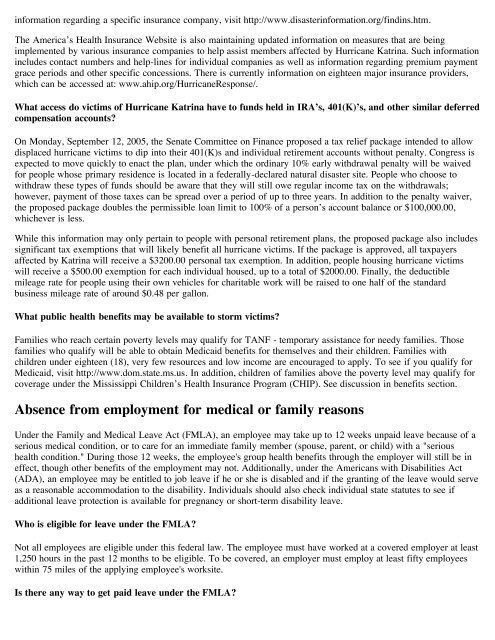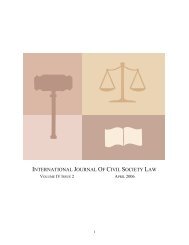Hurricane Katrina: Legal Issues - Columbus School of Law
Hurricane Katrina: Legal Issues - Columbus School of Law
Hurricane Katrina: Legal Issues - Columbus School of Law
You also want an ePaper? Increase the reach of your titles
YUMPU automatically turns print PDFs into web optimized ePapers that Google loves.
information regarding a specific insurance company, visit http://www.disasterinformation.org/findins.htm.<br />
The America’s Health Insurance Website is also maintaining updated information on measures that are being<br />
implemented by various insurance companies to help assist members affected by <strong>Hurricane</strong> <strong>Katrina</strong>. Such information<br />
includes contact numbers and help-lines for individual companies as well as information regarding premium payment<br />
grace periods and other specific concessions. There is currently information on eighteen major insurance providers,<br />
which can be accessed at: www.ahip.org/<strong>Hurricane</strong>Response/.<br />
What access do victims <strong>of</strong> <strong>Hurricane</strong> <strong>Katrina</strong> have to funds held in IRA’s, 401(K)’s, and other similar deferred<br />
compensation accounts?<br />
On Monday, September 12, 2005, the Senate Committee on Finance proposed a tax relief package intended to allow<br />
displaced hurricane victims to dip into their 401(K)s and individual retirement accounts without penalty. Congress is<br />
expected to move quickly to enact the plan, under which the ordinary 10% early withdrawal penalty will be waived<br />
for people whose primary residence is located in a federally-declared natural disaster site. People who choose to<br />
withdraw these types <strong>of</strong> funds should be aware that they will still owe regular income tax on the withdrawals;<br />
however, payment <strong>of</strong> those taxes can be spread over a period <strong>of</strong> up to three years. In addition to the penalty waiver,<br />
the proposed package doubles the permissible loan limit to 100% <strong>of</strong> a person’s account balance or $100,000.00,<br />
whichever is less.<br />
While this information may only pertain to people with personal retirement plans, the proposed package also includes<br />
significant tax exemptions that will likely benefit all hurricane victims. If the package is approved, all taxpayers<br />
affected by <strong>Katrina</strong> will receive a $3200.00 personal tax exemption. In addition, people housing hurricane victims<br />
will receive a $500.00 exemption for each individual housed, up to a total <strong>of</strong> $2000.00. Finally, the deductible<br />
mileage rate for people using their own vehicles for charitable work will be raised to one half <strong>of</strong> the standard<br />
business mileage rate <strong>of</strong> around $0.48 per gallon.<br />
What public health benefits may be available to storm victims?<br />
Families who reach certain poverty levels may qualify for TANF - temporary assistance for needy families. Those<br />
families who qualify will be able to obtain Medicaid benefits for themselves and their children. Families with<br />
children under eighteen (18), very few resources and low income are encouraged to apply. To see if you qualify for<br />
Medicaid, visit http://www.dom.state.ms.us. In addition, children <strong>of</strong> families above the poverty level may qualify for<br />
coverage under the Mississippi Children’s Health Insurance Program (CHIP). See discussion in benefits section.<br />
Absence from employment for medical or family reasons<br />
Under the Family and Medical Leave Act (FMLA), an employee may take up to 12 weeks unpaid leave because <strong>of</strong> a<br />
serious medical condition, or to care for an immediate family member (spouse, parent, or child) with a "serious<br />
health condition." During those 12 weeks, the employee's group health benefits through the employer will still be in<br />
effect, though other benefits <strong>of</strong> the employment may not. Additionally, under the Americans with Disabilities Act<br />
(ADA), an employee may be entitled to job leave if he or she is disabled and if the granting <strong>of</strong> the leave would serve<br />
as a reasonable accommodation to the disability. Individuals should also check individual state statutes to see if<br />
additional leave protection is available for pregnancy or short-term disability leave.<br />
Who is eligible for leave under the FMLA?<br />
Not all employees are eligible under this federal law. The employee must have worked at a covered employer at least<br />
1,250 hours in the past 12 months to be eligible. To be covered, an employer must employ at least fifty employees<br />
within 75 miles <strong>of</strong> the applying employee's worksite.<br />
Is there any way to get paid leave under the FMLA?

















